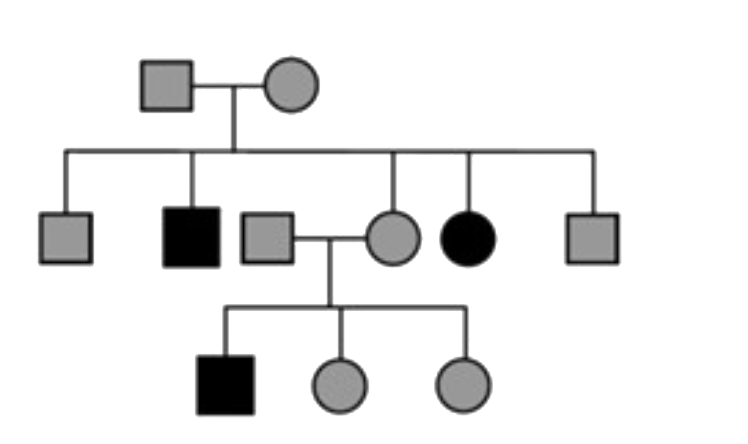Mention any two autosomal genetic disorders with their symptoms
Step-by-Step Solution
1. Understanding Autosomal Genetic Disorders:
- Autosomal genetic disorders are caused by mutations in genes located on the autosomes (non-sex chromosomes). These disorders can be inherited and affect various bodily functions.
2. Identifying the First Disorder - Sickle Cell Anemia:
- Description: Sickle cell anemia is an autosomal recessive disorder caused by a mutation in the gene that encodes the beta-globin chain of hemoglobin.
- Mutation Details: In sickle cell anemia, there is a point mutation where valine is substituted for glutamic acid at the 6th position of the beta-globin chain.
- Symptoms:
- The red blood cells (RBCs) change from their normal biconcave shape to a sickle shape.
- This alteration leads to decreased oxygen transport in the blood.
- Common symptoms include fatigue, weakness, and pain due to blocked blood vessels.
3. Identifying the Second Disorder - Phenylketonuria (PKU):
- Description: Phenylketonuria is an autosomal recessive disorder caused by a deficiency of the enzyme phenylalanine hydroxylase.
- Mutation Details: This enzyme is responsible for converting the amino acid phenylalanine into tyrosine. In PKU, this conversion does not occur due to the absence of the enzyme.
- Symptoms:
- Accumulation of phenylalanine leads to the production of phenylpyruvic acid, which can cause neurological damage.
- The most significant symptom is mental retardation or developmental delays in affected individuals.
Summary of Disorders and Symptoms
- Sickle Cell Anemia:
- Symptoms: Sickle-shaped RBCs, decreased oxygen transport, fatigue, weakness, and pain.
- Phenylketonuria (PKU):
- Symptoms: Accumulation of phenylalanine, mental retardation, and developmental delays.
---
- Autosomal genetic disorders are caused by mutations in genes located on the autosomes (non-sex chromosomes). These disorders can be inherited and affect various bodily functions.
- Description: Sickle cell anemia is an autosomal recessive disorder caused by a mutation in the gene that encodes the beta-globin chain of hemoglobin.
- Mutation Details: In sickle cell anemia, there is a point mutation where valine is substituted for glutamic acid at the 6th position of the beta-globin chain.
- Symptoms:
- The red blood cells (RBCs) change from their normal biconcave shape to a sickle shape.
- This alteration leads to decreased oxygen transport in the blood.
- Common symptoms include fatigue, weakness, and pain due to blocked blood vessels.
- Description: Phenylketonuria is an autosomal recessive disorder caused by a deficiency of the enzyme phenylalanine hydroxylase.
- Mutation Details: This enzyme is responsible for converting the amino acid phenylalanine into tyrosine. In PKU, this conversion does not occur due to the absence of the enzyme.
- Symptoms:
- Accumulation of phenylalanine leads to the production of phenylpyruvic acid, which can cause neurological damage.
- The most significant symptom is mental retardation or developmental delays in affected individuals.
- Sickle Cell Anemia:
- Symptoms: Sickle-shaped RBCs, decreased oxygen transport, fatigue, weakness, and pain.
- Phenylketonuria (PKU):
- Symptoms: Accumulation of phenylalanine, mental retardation, and developmental delays.
Topper's Solved these Questions
Similar Questions
Knowledge Check
A genetic disorder can be cured through
ArDNA technologyBembryo transferCgene therapyDall of these
A genetic muscular disorder is
View SolutionHaemophilia is a genetic disorder in which
View SolutionHow does gain or loss of chromosome(s) takes place in humans ? Describe one example each of chromosomal disorder along with the symptoms involving an autosome and a sex chromosome.
View SolutionGiven pedigree belongs to autosomal recessive disorder , which of the following represents parental genotypes correctly ?

View SolutionNumber of genetic disorders in human beings is
View SolutionMention any two achievements of the Moderates.
View SolutionPhenylketoniuria is autosomal recessive disorder of chromosome
View Solution
